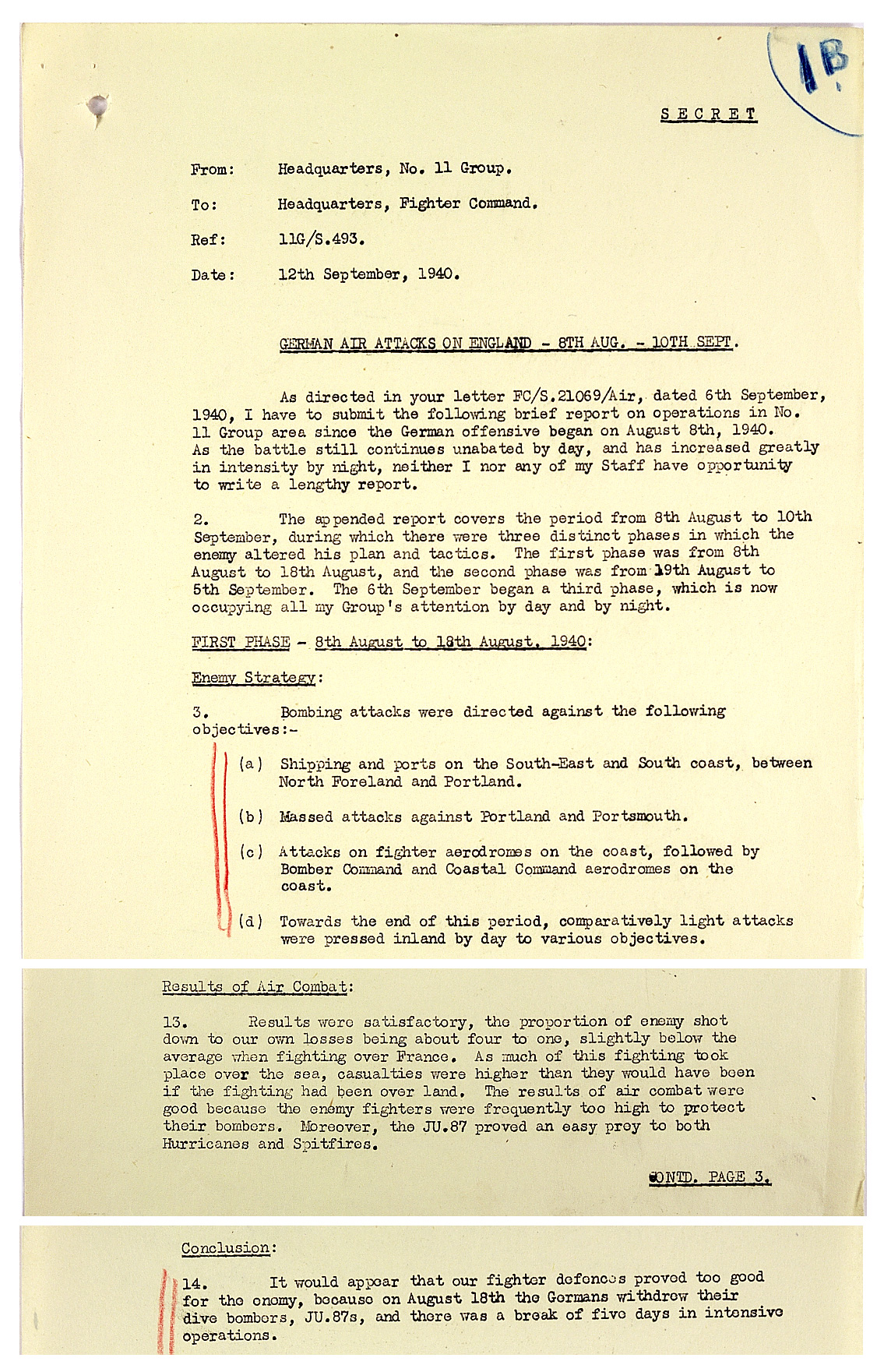
German Air Attacks on England, 8 August 1940 –10 September 1940, Catalogue ref: AIR 2/7355
After the fall of France, Germany prepared to invade Britain in June 1940. The plan was to destroy the British air force and stop it sinking the ships that would carry German soldiers across the Channel. Bombing raids on Britain started in July. In August the German air force concentrated its attack upon airfields, aircraft factories and radar stations. The Royal Air Force fought back in what was later known as the Battle of Britain. The attack later switched to other targets, such as docks, factories and railways. As most of these targets were in cities and towns, many bombs fell upon streets and houses, killing people and destroying property.
On 7 September 1940, 300 German bombers raided the London docks until May 1941. Other cities and towns were also heavily bombed, including Swansea, Cardiff, Bristol, Southampton, Plymouth, Birmingham, Coventry and Liverpool. From October 5, the German raids took place at night and the British defences of anti-aircraft guns and night fighters could not stop them. The Blitz ended in mid-May 1941, when much of the German air force was sent east to prepare for the invasion of Russia. The immediate threat of a German invasion of Britain was over, although bombing was to continue at less intensive levels in 1942 and 1943.
- Where were German attacks made in the first phase of the Blitz or bombing campaign against Britain?
- Which British cities were to be attacked as part of the ‘Moonlight Sonata’ German bombing campaign? Catalogue ref: AIR 2/5238
- What were the aims of the British counter plan called ‘Cold Water’. Can you guess why it was called this? Catalogue ref: AIR 2/5238
- Take a look at the photograph showing bomb damage Catalogue ref: HO 197/28. How could photographs like this be used to persuade people to use public shelters?
- What does this photograph reveal about the nature of bombing raids?
Transcript
SECRET
From: Headquarters, No. 11 Group.
To: Headquarters, Fighter Command.
Ref: 11G/S.493.
Date: 12th September, 1940.
GERMAN AIR ATTACKS ON ENGLAND – 8TH AUG. – 10TH SEPT
As directed in your letter FC/S.21069/Air, dated 6th September, 1940, I have to submit the following brief report on operations in No. 11 Group area since the German offensive began on August 8th, 1940. As the battle still continues unabated by day, and has increased greatly in intensity by night, neither I nor any of my staff have opportunity to write a lengthy report.
2. The appended report covers the period from 8th August to 10th September, during which there were three distinct phases in which the enemy altered his plan and tactics. The first phase was from 8th August to 18th August, and the second phase was from 19th August to 5th September. The 6th September began a third phase, which is now occupying all my Group’s attention by day and by night.
FIRST PHASE – 8th August to 18th August, 1940:
Enemy Strategy:
3. Bombing attacks were directed against the following objectives:-
(a) Shipping and ports on the South-East and South coast, between North Foreland and Portland.
(b) Massed attacks against Portland and Portsmouth.
(c) Attacks on fighter aerodromes on the coast, followed by Bomber Command and Coastal Command aerodromes on the coast.
(d) Towards the end of this period, comparatively light attacks were pressed inland by day to various objectives.
…
Results of Air Combat:
13. Results were satisfactory, the proportion of enemy shot down to our own losses being about four to one, slightly below the average when fighting over France. As much of this fighting took place over the sea, casualties were higher than they would have been if the fighting had been over land. The results of air combat were good because the enemy fighters were frequently too high to protect their bombers. Moreover, the JU.87 proved an easy prey to both Hurricanes and Spitfires.
…
Conclusion:
14. It would appear that our fighter defences proved too good for the enemy, because on August 18th the Germans withdrew their dive bombers, JU.87s, and there was a break of five days in intensive operations.
